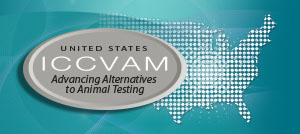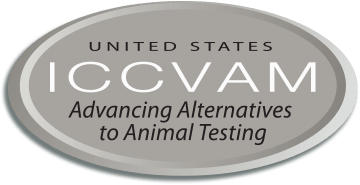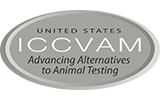Message from NIEHS and NTP
We are pleased to share with you the many accomplishments of the National Toxicology Program (NTP) Interagency Center for the Evaluation of Alternative Toxicological Methods (NICEATM), the Interagency Coordinating Committee on the Validation of Alternative Methods (ICCVAM), and the 17 ICCVAM agencies in the 2022-2023 Biennial Report. These accomplishments address needs and priorities identified in the “Strategic Roadmap for Establishing New Approaches to Evaluate the Safety of Chemicals and Medical Products in the United States.”
One of the three goals stated in the Strategic Roadmap is to “foster the use of efficient, flexible, and robust practices to establish confidence in new methods.” The ICCVAM Validation Workgroup, with participation from 10 of the 17 ICCVAM member agencies, provided an important resource supporting that goal with publication of its report, “Validation, Qualification, and Regulatory Acceptance of New Approach Methodologies.” In addition, publications coauthored by members of the workgroup informed the criteria and processes described in that report, including approaches for quality management (Petersen et al. 2023) and establishing confidence (van der Zalm et al. 2022) in new approach methodologies (NAMs). With these publications, ICCVAM assumed a central role in establishing criteria for the appropriate evaluation of NAMs.
To address specific testing needs in 2022-2023, NICEATM and ICCVAM continued to engage in collaborative efforts to replace, reduce, and refine animal use for acute toxicity testing. This report describes progress in replacement of animal use for skin sensitization testing, with information about the largest existing database of human reference data for skin sensitization and about broadening applicability of defined approaches for skin sensitization. Collaborations among ICCVAM agencies and their stakeholders produced computational models that can predict a variety of toxicities and demonstrated how these models can be useful in a regulatory context. An important example is the application of the Collaborative Acute Toxicity Modeling Suite to predict toxicity of pesticide active ingredients. Member agencies also conducted retrospective data analyses to identify opportunities to reduce the number of species needed for regulatory testing, which can have immediate impact in reducing animal use while maintaining public health protection.
A key area of the Strategic Roadmap is communication. During 2022-2023, NICEATM and ICCVAM continued to effectively connect with stakeholders, as demonstrated by the high attendance and strong participation at ICCVAM-sponsored virtual public events including the Communities of Practice webinars and the Public Forums. Increased interest in engaging with ICCVAM prompted the need for a forum specifically targeted to method developers, which will launch in 2024 and operationalize key concepts from the ICCVAM Validation Workgroup report. In addition, NICEATM and ICCVAM agencies such as the U.S. Environmental Protection Agency and the U.S. Food and Drug Administration sponsored virtual events to educate and engage stakeholders on progress toward the validation, acceptance, and use of alternatives to animal testing. Details and outcomes of many of these events are described herein.
The importance and relevance of ICCVAM’s work is reflected in its continued growth as an interagency committee. Established in 2000 with 15 member agencies, ICCVAM grew to 18 member agencies in 2024 with addition of the National Center for Advancing Translational Sciences (NCATS). NCATS plays a central role in Tox21 and other U.S. federal efforts to advance alternatives to animal testing and has made valuable contributions to ICCVAM workgroups. We welcome their broader participation in ICCVAM’s activities as an ICCVAM member.
The activities in this 2022-2023 Biennial Report illustrate the outstanding contributions of ICCVAM to advance alternative methodologies and the 3Rs. We invite you to read this report to learn about all that ICCVAM has been accomplished in the past two years.
Richard Woychik, Ph.D.
Director, National Institute of Environmental Health Sciences and National Toxicology Program
Heather Patisaul, Ph.D.
Scientific Director, Division of Translational Toxicology, National Institute of Environmental Health Sciences

NIEHS Director Rick Woychik, Ph.D.

NIEHS Division of Translational Toxicology Scientific Director Heather Patisaul, Ph.D.



